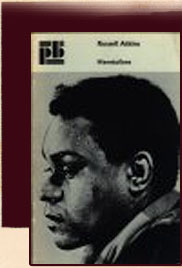| |
Russell Atkins
Russell Atkins (b. 1926), is a poet, composer, theorist, editor, and leading innovator in experimental artistic movements of the 1940s through the 1970s. Born February 25, 1926 in Cleveland, Russell Atkins began studying piano at age seven with his mother. From childhood, he exhibited talent in painting, drawing, music, and writing. By age thirteen he had won several poetry contests. Atkins published his first poem in 1944 in his high school yearbook. With the support of prominent literary figures, Atkins published his poetry in journals and newspapers, including Experiment (1947–1951) and the New York Times (1951).
Atkins continued his studies of music, performance, and the visual arts through Cleveland College, Cleveland Music School Settlement, Cleveland Institute of Music, Karamu Theatre, and Cleveland School of Art. Musical training is a key to Atkins's poetic style since musical structures are central in his writing.
In 1950 Atkins cofounded what is probably the oldest black-owned literary magazine, Free Lance, a publication of avant-garde writing that contributed to the development of New American poetry. He created a style of concrete poetry in which visual presentation of words on the page predominates. He experimented stylistically with the extreme use of the apostrophe, embedding of words within words, and use of continuous words. In the mid- 1950s he began utilizing an abstract technique he called “phenomenalism,” which juxtaposed unfamiliar and familiar elements. Atkins advocated using the imagination “to exploit range, to create a body of effect, event, colors, characteristics, moods, verbal stresses pushed to a maximum.” He did not try to make his work comprehensible to casual readers but strove for dense complexity of meaning.
Atkins experimented with “poems in play forms,” publishing two plays in 1954, The Abortionist and The Corpse. Like his poetry, his plays radically challenged conventions of both form and content.
In its 1955–1956 issue, Free Lance published Atkins's influential article, “A Psychovisual Perspective for ‘Musical’ Composition”. Using Gestalt theory of pattern formation, Atkins argues for the brain and not the ear as the focus of composition.
In 1960 Atkins published his first collection of poetry, A Podium Presentation. Subsequent volumes include Phenomena (1961), Objects (1963), Objects 2 (1964), Heretofore (1968), The Nail, to Be Set to Music (1970), Maleficium (1971), Here in The (1976), and Whichever (1978).
source: http://www.answers.com/topic/russell-atkins
http://www.verdantpress.com/russellatkins.html
Backyard
by Russell Atkins
reaches about
and has hold
of the throats
of trees
-- such shake it to death wild!
the snow octopus
widths into blizzards
of mists
then furiouses!
a dash through sky
flung tentacles
jet
full squid
Old Man Carrying A Bible In A High Crime Area
by Russell Atkins
Condense, will it? grow a barrel
for shooting?
flash open and spit God's
electric al bullets, Leviticus
as the holy trigger - the thief
drops into hell? book develops
dimensions turned sanctuary
where no muggers plunder?
Does the dope fiend defer
to this, struck to a fix? will the book
in black, cleric vestment
convert loose women?
Old friend, listen: don't wait
- when they come at you,
throw it at them!
Spring's Generation Gap
by Russell Atkins
it takes evening
a long time to arrive -- it
feebles (slow old man
still trying to hold down a job,
decrepit) forced to move fast
-- janitor of the above offices!
he replaces things that
were used puts them in special
dark corners, closes shadows
into spaces like doors,
straightens, covers until
all seems gone
just before
youthful day comes to work
demanding, "Hey, dad –
where the hell is everything?!"
Transit
by Russell Atkins
th' baby came forward
with out-held arms
saying, " -- dah!"
to me?
I
knew a terror not to dare!
with fled I rushed
about the terminal
looking for things going now
like a bus for Canada ---
a car's approach:
"I need the swift of your help,"
I said, " -- a baby
with arms out-held!"
the driver said, "I dig!
(he knew the worst)
let's split
|
|
 |
|